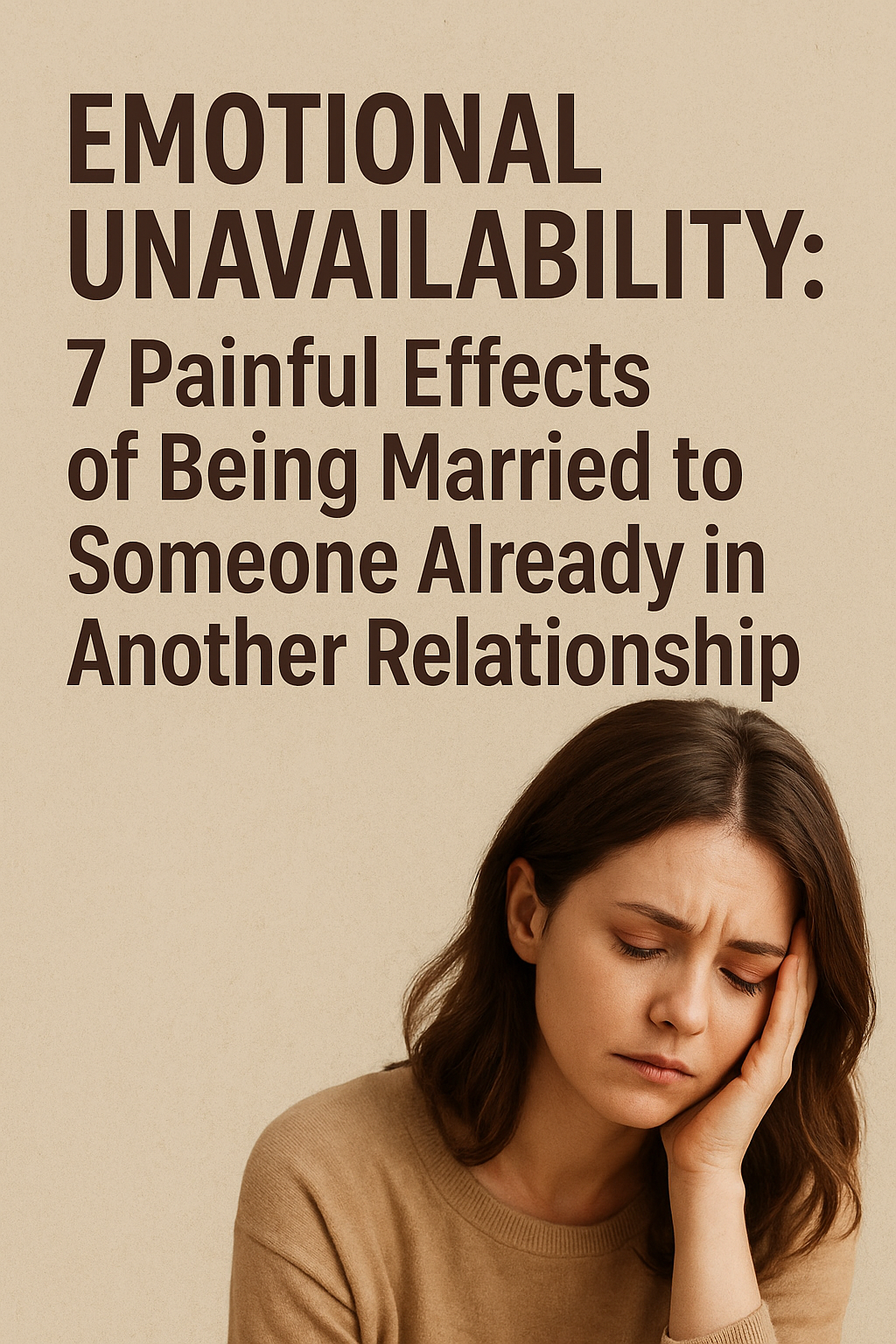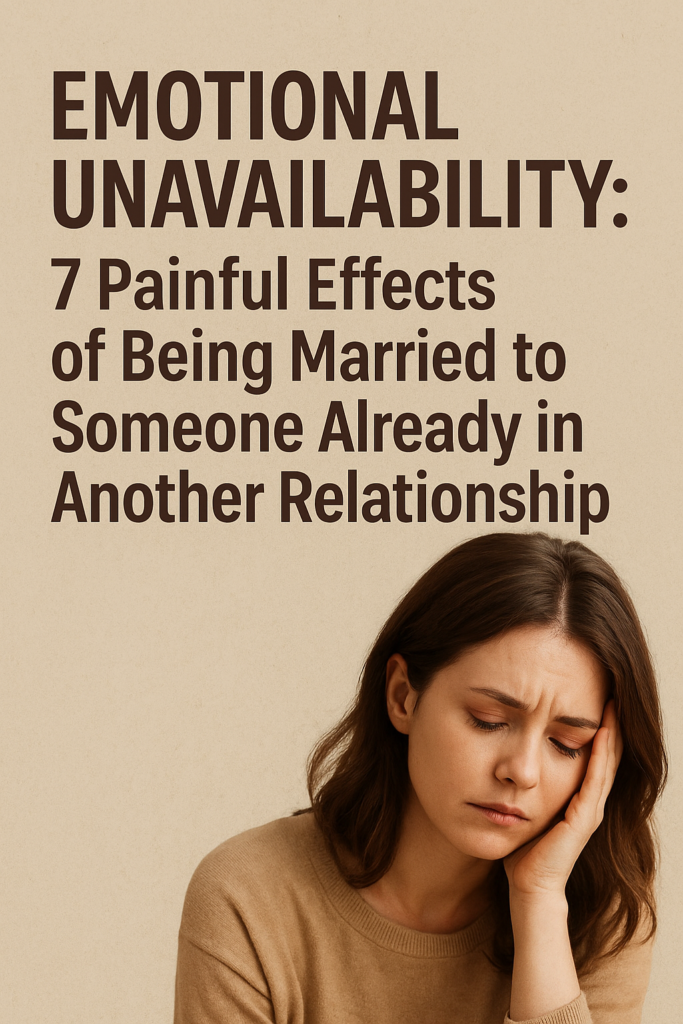
Emotional Unavailability: 10 Heartbreaking Signs You’re Married but Not Truly Loved
Emotional Unavailability: What It Feels Like to Be Married to Someone Already in Another Relationship
Marriage is often imagined as a space of trust, love, and companionship. But what happens when you find yourself married to someone who is already emotionally tied to another relationship? Living with an emotionally unavailable partner can feel like being physically close yet miles apart emotionally. It’s a silent struggle, one that many face but rarely talk about.
In this blog, we’ll explore what a person feels when they are married to someone who is already emotionally or romantically invested elsewhere, and the deep psychological impact it can have. Feeling associated with Emotional Unavailability of a partner is huge.
The Pain of Emotionally Unavailability Partner
At the heart of every marriage lies the need for emotional connection. But with an emotionally unavailable partner, there is a constant feeling of absence. Even when the person is present physically, their mind and heart are elsewhere.
Emotional Unavailability creates feelings of:
- Loneliness within togetherness – you share a home but not a bond.
- Unanswered needs – your desire for emotional intimacy feels ignored.
- Emptiness in conversations – words become routine, lacking genuine care.
The partner who longs for connection often feels like they are speaking into a void, unheard and unseen.
Living in Constant Comparison due to Emotional Unavailability
When a spouse is already in another relationship, even if hidden, the one who is emotionally neglected constantly feels compared. Subtle cues like lack of attention, shorter conversations, or disinterest in shared activities create a silent hierarchy—where someone else always comes first.
This comparison leads to:
- Self-doubt about worth and attractiveness.
- Anxiety over whether you will ever be “enough.”
- Jealousy mixed with helplessness, as the bond you deserve is being given to someone else.
Emotional Unavailability: The Strain of Betrayal and Broken Trust
Trust is the foundation of a healthy marriage. But when your spouse is emotionally unavailable because of another relationship, the sense of betrayal is overwhelming. Even if they have not physically left, their heart and mind have already departed.
This betrayal manifests as:
- Loss of safety – you no longer feel secure in the relationship.
- Anger and confusion – torn between confronting them or staying silent.
- A cycle of hope and despair – hoping they will return emotionally but seeing no real change.
Mental Health Impact of an Emotionally Unavailable Partner
Being in such a marriage takes a toll on mental health. Over time, the emotional neglect can transform into deeper psychological wounds.
Common effects include:
- Low self-esteem – questioning your own worth because your needs are ignored.
- Chronic stress and anxiety – worrying about the future of the marriage.
- Depression and isolation – withdrawing because you feel unloved and unwanted.
- Identity crisis – losing your sense of self while trying to hold the marriage together.
For many, it feels like a slow erosion of emotional stability, as if the very ground of their relationship is slipping away.
Why People Stay Despite Emotional Unavailability
An important question arises: why do people continue in marriages where the partner is emotionally unavailable? Some reasons include:
- Fear of societal judgment – divorce or separation carries stigma in many cultures.
- Children and family responsibilities – the desire to keep a stable home for kids.
- Hope for change – believing the partner might eventually return emotionally.
- Financial dependence – the inability to leave due to economic reasons.
These factors often trap individuals in cycles of silent suffering, even when the relationship is deeply unfulfilling.
The Silent Grief of Unlived Love
Being married to an emotionally unavailable partner is like mourning a relationship that never fully existed. You grieve not only what is lost but also what could have been—conversations you never had, intimacy that never blossomed, and love that remained unexpressed.
This silent grief is heavy because it has no closure. Unlike a breakup where both parties part ways, here you remain physically together, yet emotionally worlds apart.
Coping with the Pain
While every situation is unique, certain strategies can help in coping with such an emotionally draining marriage:
- Acknowledge your feelings – don’t minimize your pain; validate your emotional reality.
- Seek support – talking to a therapist or counselor helps process the hurt and confusion.
- Strengthen self-worth – engage in activities that remind you of your value outside the marriage.
- Set emotional boundaries – recognize what you can tolerate and where you need to protect yourself.
- Open communication – even if difficult, expressing your feelings may create awareness for your partner.
Choosing Between Holding On and Letting Go by Emotional Unavailability
One of the hardest decisions is whether to continue the marriage or walk away. Staying requires acceptance of limitations, while leaving requires courage to rebuild life.
If your emotionally unavailable partner shows willingness to work on the relationship through counseling or honest effort, healing is possible. But if they remain committed elsewhere emotionally, sometimes the healthiest choice is to prioritize your own mental and emotional wellbeing.
A Journey Toward Healing
Living with an emotionally unavailable spouse who is invested in another relationship is undeniably painful. Yet, this pain can also become the start of a journey toward self-discovery.
By acknowledging the hurt, seeking support, and making conscious decisions about the relationship, individuals can find strength to reclaim their identity and emotional health. Whether that journey leads to rebuilding the marriage or moving forward independently, it is a step toward healing and freedom.
Final Thoughts
Marriage to an emotionally unavailable partner feels like living in constant shadows. The pain of neglect, betrayal, and loneliness can weigh heavily on the heart. But no one deserves to remain trapped in silent suffering.
Your emotions are valid, your needs are real, and your mental health matters. With self-awareness, support, and courage, it is possible to step out of the cycle of pain and create a life where you feel seen, valued, and truly loved.

